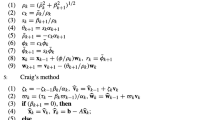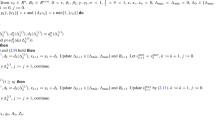Abstract.
A global convergence proof is presented for a class of trust region filter–type methods for nonlinear programming. Such methods are characterized by their use of the dominance concept of multiobjective optimization, instead of a penalty parameter whose adjustment can be problematic. The methods are based on successively solving linear programming subproblems for which effective software is readily available. The methods also permit the use of steps calculated on the basis of an equality constrained quadratic programming model, which enables rapid convergence to take place for problems in which second order information is important.
The proof technique is presented in a fairly general context, allowing a range of specific algorithm choices associated with choosing the quadratic model, updating the trust region radius and with feasibility restoration.
Similar content being viewed by others
Author information
Authors and Affiliations
Additional information
Received: July 4, 2001 / Accepted: December 19, 2002 Published online: March 21, 2003
Mathematics Subject Classification (2000): 20E28, 20G40, 20C20
Rights and permissions
About this article
Cite this article
Chin, C., Fletcher, R. On the global convergence of an SLP–filter algorithm that takes EQP steps. Math. Program., Ser. A 96, 161–177 (2003). https://doi.org/10.1007/s10107-003-0378-6
Issue Date:
DOI: https://doi.org/10.1007/s10107-003-0378-6




